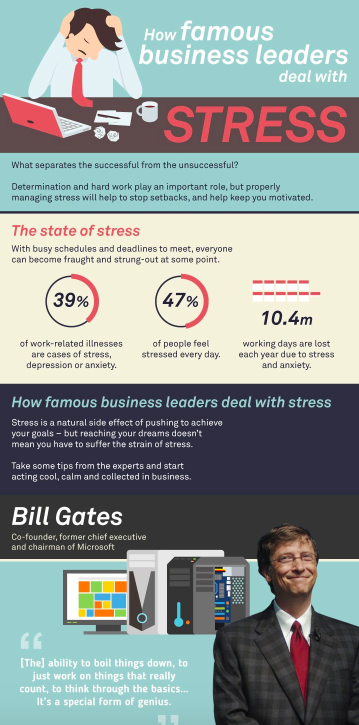
I’m not a big fan of infographics. You know, those visual snapshots that boil down entire subjects to a few statistics and sound bites. Infographics and social media are how our ADHD world consumes information. Data without all the muss and fuss of nuance, context, reason and experience.
Imagine my surprise to find an infographic that’s actually somewhat useful: How famous business leaders deal with stress. Not that I stress over that sort of thing, at least not anymore. When you’ve been around as long as I have, you’ve either figured out what works or found yourself locked up in a padded room somewhere.
 Besides, the pressures of being a senior executive in the high-tech industry were enormous. You either learn to control it or it controls you. The same goes for running a small business. It’s always feast or famine and each extreme produces its own kind of psychological torture.
Besides, the pressures of being a senior executive in the high-tech industry were enormous. You either learn to control it or it controls you. The same goes for running a small business. It’s always feast or famine and each extreme produces its own kind of psychological torture.
You have to learn to manage whatever life throws at you. And while the Infographic does offer some solid advice, I wanted to provide some context to sort of round it out and make it a little more useful.
First, let me dispel a common misconception about stress. It’s not always bad for you. Not to get technical, but physical and mental stress from competition and adversity can actually drive you to perform your best. We often come up with our most inspired ideas and innovative solutions under stress. Some people thrive on it. Others, not so much.
Granted, chronic stress can lead to burnout and depression. There’s healthy stress and unhealthy stress. But these days I see a lot of people who should be working way harder than they are using stress as an excuse to become unproductive slackers. That’s BS.
Second, one person’s way of managing stress might appear to contradict another’s. That’s what happens when you try to reduce complex concepts down to pithy bullet points, like infographics tend to do.
For example, Amazon CEO Jeff Bezos says taking action reduces stress. But Steve Jobs practiced a type of meditation that involves sitting quietly and observing. Those two methods might seem at odds but they’re really not. I actually use both, depending on the circumstance.
When I’m feeling the pressure of having too much to do, I prioritize and then start knocking them off, one by one. Sort of the Bezos method. But mindfulness is probably more effective in dealing with complex or emotional dilemmas. After all, it’s sort of hard to access your feelings and intuition when you’re running around getting things done.
Elon Musk says you should ignore fear if it’s irrational. First, fear and stress are not the same thing. Second, you can’t always tell if you’re being irrational in the midst of freaking out. Besides, fear is often your instincts sending you a message. Snub it at your own risk.
Here’s a stress buster the Infographic missed: Strenuous exercise. When stress builds up to a boiling point, that’s the only thing that works for a hyper neurotic control freak like me.
Stress triggers your body’s fight or flight response. I don’t know about you, but I can barely keep from jumping out of my skin – let alone think or feel – with all that adrenaline and cortisol flooding my system. A 30-minute run returns my body to normal and calms me down so the other methods can do their magic.
Which brings us to the only advice I strongly disagree with, although it might have been taken out of context. Twitter and Square CEO Jack Dorsey says you should build “rituals” and “consistency” in your schedule to minimize the “unexpected.”
It’s true that discipline, focus and organization will help you to be more effective and productive. That said, all the habits and planning in the world will not make life more predictable. On the contrary, being flexible and adaptable will help you react more effectively when the $#*! unexpectedly hits the fan, as it so often does.
My advice: Don’t stress about stress. Just do whatever works and, if it ain’t broke, don’t fix it. As the great John Lennon said, “Whatever gets you through the night; it’s alright, it’s alright.”
Image credit Firesam! via Flickr
A version of this originally appeared on Entrepreneur.com.